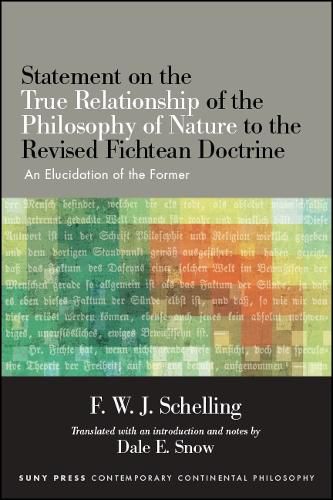Readings Newsletter
Become a Readings Member to make your shopping experience even easier.
Sign in or sign up for free!
You’re not far away from qualifying for FREE standard shipping within Australia
You’ve qualified for FREE standard shipping within Australia
The cart is loading…






This title is printed to order. This book may have been self-published. If so, we cannot guarantee the quality of the content. In the main most books will have gone through the editing process however some may not. We therefore suggest that you be aware of this before ordering this book. If in doubt check either the author or publisher’s details as we are unable to accept any returns unless they are faulty. Please contact us if you have any questions.
The heat of anger can concentrate the mind. Convinced that he had been betrayed by his former collaborator and colleague, Schelling attempts in this polemic to reach a final reckoning with Fichte. Employing the format of a book review, Schelling directs withering scorn at three of Fichte’s recent publications, at one point likening them to the hell, purgatory, and would-be paradise of Fichtean philosophy. The central bone of contention is the understanding of nature: Fichte sees it as lifeless matter in motion, sheer opposition to be overcome, while Schelling waxes poetic in his defense of a living, organic nature of which humanity is a vital part. Indeed, we do not know ourselves without understanding our connection to nature, argues Schelling, anticipating many thinkers in contemporary environmental ethics.
Dale E. Snow’s introduction sets the stage and explains the larger context of the conflict, which was already visible in the correspondence of the two philosophers, which broke off by 1802. Notes are included throughout the text, providing background information and identifying the many references to Fichte.
$9.00 standard shipping within Australia
FREE standard shipping within Australia for orders over $100.00
Express & International shipping calculated at checkout
This title is printed to order. This book may have been self-published. If so, we cannot guarantee the quality of the content. In the main most books will have gone through the editing process however some may not. We therefore suggest that you be aware of this before ordering this book. If in doubt check either the author or publisher’s details as we are unable to accept any returns unless they are faulty. Please contact us if you have any questions.
The heat of anger can concentrate the mind. Convinced that he had been betrayed by his former collaborator and colleague, Schelling attempts in this polemic to reach a final reckoning with Fichte. Employing the format of a book review, Schelling directs withering scorn at three of Fichte’s recent publications, at one point likening them to the hell, purgatory, and would-be paradise of Fichtean philosophy. The central bone of contention is the understanding of nature: Fichte sees it as lifeless matter in motion, sheer opposition to be overcome, while Schelling waxes poetic in his defense of a living, organic nature of which humanity is a vital part. Indeed, we do not know ourselves without understanding our connection to nature, argues Schelling, anticipating many thinkers in contemporary environmental ethics.
Dale E. Snow’s introduction sets the stage and explains the larger context of the conflict, which was already visible in the correspondence of the two philosophers, which broke off by 1802. Notes are included throughout the text, providing background information and identifying the many references to Fichte.